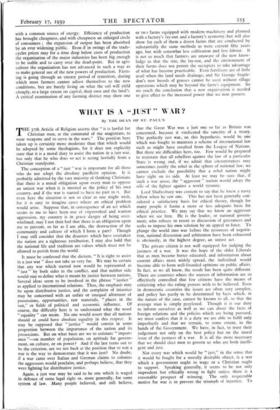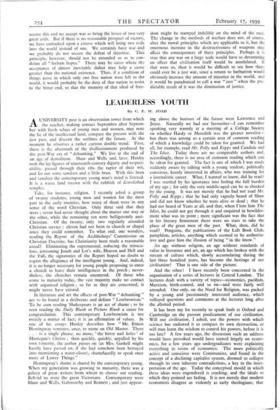WHAT IS A "JUST " WAR ?
By THE DEAN OF ST. PAUL'S
THE 37th Article of Religion asserts that " it is lawful for Christian men, at the command of the magistrate, to wear weapons and to serve in the wars." The position here taken up is certainly more moderate than that which would be adopted by some theologians, for it does not explicitly state that it is a moral duty to assist the nation in a just war, but only that he who does so act is acting lawfully from a Christian standpoint.
The conception of a " just " war is important for all those who do not adopt the absolute pacificist opinion. It is probably admitted by the vast majority of thinking Christians that there is a moral obligation upon every man to oppose an unjust war when it is mooted as the policy of his own country, and if the war is started to have no part in 't. But even here the situation is not so clear as one might wish, for it is easy to imagine cases where an ethical problem would arise. Suppose that, in consequence of an act which seems to me to have been one of unprovoked and wanton aggression, my country is in grave danger of being over- whelmed, may I not then feel that there is an obligation upon me to prevent, so far as I am able, the destruction of the community and culture of which I form a part? Though I may still consider that the disasters which have overtaken the nation are a righteous retribution, I may also hold that the national life and tradition are values which must not be allowed to perish from the world.
It must be confessed that the dictum, " It is right to assist in a just war " does not take us very far. We may be certain that any war which started now would be represented as " just " by both sides in the conflict, and that neither side would stay to define what it meant by justice between nations. Several ideas seem to be involved in the phrase " justice " as applied to international relations. Thus, the emphasis may be upon distributive justice, and the complaint of injustice may be concerned with an unfair or unequal allotment of possessions, opportunities, raw materials, " places in the sun," or fields of political and economic influence. Of course, the difficulty here is to understand what the word " equality " can mean. No one would assert that all nations should or could have absolute equality in this respect. It may be supposed that " justice " would consist in some proportion between the importance of the nation and its possessions. But on what basis are we to estimate " import- ance "—on number of population, on aptitude for govern- ment, on culture, or on power? And if the last turns out to be the criterion, are we not back at the position that to win a war is the way to demonstrate that it was just? No doubt, if a war came over Italian and German claims to colonies the aggressors would proclaim, and perhaps believe, that they were fighting for distributive justice.
Again, a just war may be said to be one which is waged in defence of some legal right or, more generally, for some system of law. Many people believed, and still believe, that the Great War was a just one so far as Britain was concerned, because it vindicated the sanctity of a treaty. The perfectly just war, on this hypothesis, would be one which was fought to maintain a scheme of international law such as might have resulted from the League of Nations. But there are difficulties here, too. Few would be prepared to maintain that all rebellion against the law of a particular State is wrong and, if we admit that circumstances may sometimes justify the rebel in the sphere of national law, we cannot exclude the possibility that a rebel nation might have right on its side. At least we may be sure that, if such a war arose, the " aggressor " nation would adopt the role of the fighter against a world tyranny.
Lord Shaftesbury was content to say that he knew a nasty fellow when he saw one. This has not been generally con- sidered a satisfactory basis for ethical theory, though for many people it forms a more or less adequate basis for ethical practice. We may say that we know an aggressor when we see him. He is the leader, or national govern- ment, who refuses to resort to discussion of grievances and seeks to impose his own solution by an appeal to force. To plunge the world into war before the resources of negotia- tion, national discussion and arbitration have been exhausted is obviously, in the highest degree, an unjust act.
The private citizen is not well equipped for judging the justness of a war. It was the hope of the older Liberals that as men became better educated, and information about current affairs more widely spread, the individual would become able to form well-founded opinions on public affairs. In fact, as we all know, the result has been quite different. There are countries where the sources of information are so effectively controlled that few citizens have the means of criticising what the ruling powers wish to be believed. Even in democratic countries the issues are often very complex, and policy has partly to be determined by facts which, in the nature of the case, cannot be known to all, so that the average man is simply perplexed. Though it is our duty to inform ourselves as well as we can about the facts of foreign relations and the policies which are being pursued, we must confess that it is a duty we are able to fulfil only imperfectly and that we remain, to some extent, in the hands of the Government. We have, in fact, to trust their judgement not only on the best policy but on the moral issue of the justness of a war. It is all the more necessary that we should elect men to govern us who are both intelli- gent and just.
Not every war which would be " just," in the sense that it would be fought for a morally desirable object, is a war which a government ought to wage or a Christian ought to support. Speaking generally, it seems to be not only imprudent but ethically wrong to fight unless there is a reasonable prospect of winning. The only respectable motive for war is to prevent the triumph of injustice. To secure this end we accept war as being the lesser of two very great evils. But if there is no reasonable prospect of victory, we have embarked upon a course which will bring two evils into the world instead of one. We certainly have war and we probably do not secure the defeat of injustice. This principle, however, should not be extended so as to con- demn all " forlorn hopes." There may be cases where the acceptance of almost inevitable defeat may help a cause greater than the national existence. Thus, if a condition of things arose in which only one free nation were left in the world, it would probably be the duty of that nation to resist to the bitter end, so that the memory of that ideal of free- dom might be stamped indelibly on the mind of the race. The change in the methods of warfare does not, of course, alter the moral principles which are applicable to it, but the enormous increase in the destructiveness of weapons may affect the consequences of these principles. Perhaps it is true that any war on a large scale would have so devastating an effect that civilisation itself would be annihilated. If that were so, then it would be difficult to see how there could ever be a just war, since a return to barbarism would obviously increase the amount of injustice in the world, and it would be paradoxical to call a war " just " when the pre- dictable result of it was the diminution of justice.











































 Previous page
Previous page